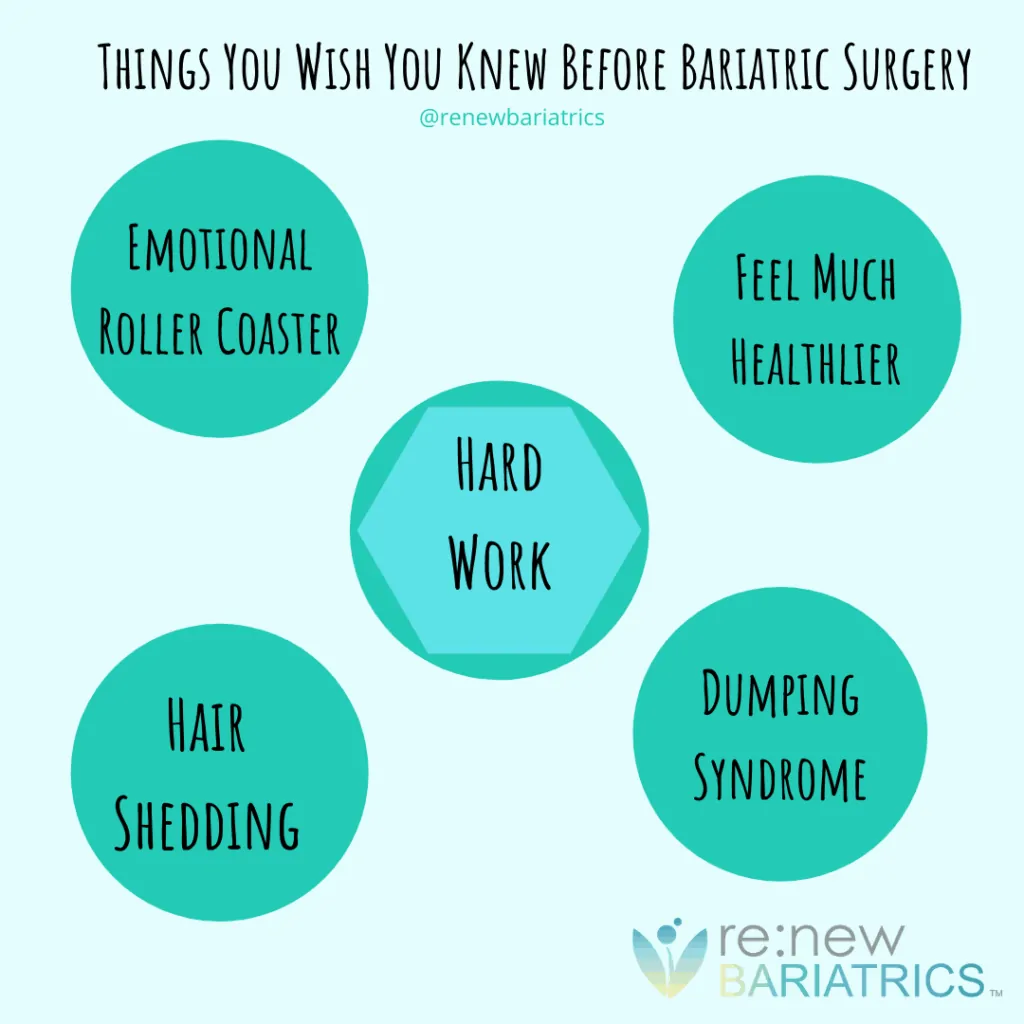Things I Wish I Knew Before Having Bariatric Surgery
It’s a big decision to undergo weight loss surgery, and you will no doubt do a lot of research in preparation. But there are some things that only a person who has gone through the process knows.
In this article, Renew Bariatrics, a bariatric surgery group in Mexico, has a past patient share the things they wish they knew before bariatric surgery. You will find what caught me by surprise. What I was unprepared for. I hope it will help you prepare, both mentally and physically, for what will undoubtedly be a life-changing procedure.
Weight Loss Surgery is Not a Quick Fix
You have probably heard this before, but I cannot stress it enough. Bariatric surgery is the first step in a lifelong commitment to a healthy lifestyle. You will need to adhere to a post operative diet, exercise regularly, and watch your food intake. Old habits will have to go. New behaviors will be critical for keeping the weight off.
Accountability is essential for long-term success with weight loss. Some of the ways you make yourself accountable include:
- Track your food intake
- Involve loved ones
- See a therapist
- Go to a support group
Bariatric surgery can be an emotional roller coaster
The rapid and significant weight loss after bariatric surgery can cause emotional turmoil. You’ll be forced to confront the reason why you overate to the point of becoming obese. Was it an addiction? Was it a coping mechanism? Once you’ve identified the reason, you’ll need to find healthy ways to control food intake and manage stress.
There will also be emotions related to body image.
Friends and family may treat you differently. Looking in the mirror, you might feel like you don’t know the person staring back at you. Everyone’s journey is different. But, it’s important to be prepared for the emotions and feelings that dramatic weight loss may bring up.
Awareness of Changes
You’re probably aware that the stomach will be smaller and hormonal changes will reduce appetite after bariatric surgery. But did you know you’ll no longer be hungry at all?
It surprised me that I had to force myself to eat and drink, even small portions, to stay hydrated and nourished. I missed the act of eating – the smelling and chewing of food. I missed eating regular food in social settings.
I expected to lose weight, of course, but I didn’t expect to feel so much healthier. I was able to get off some of my medications. My aches and pains were pretty much gone. I found I was more mobile and flexible. My libido came back. After my bariatric surgery, there’s been a sense of physical and mental well-being that was missing before.
I wasn’t expecting hair shedding after bariatric surgery. It caught me by surprise and gave me many sleepless nights. I wish I’d known that hair shedding after weight loss surgery can happen to men and women of all ages and ethnicities. It can go on for 3-6 months. Hair fall occurs because the body has gone through trauma. Also, there is less protein and nutrient absorption post-surgery.
Dumping syndrome – I’d heard about it, but I didn’t know I’d have to limit sugar consumption for years after my surgery. Any time I eat more than 10-15 grams of sugar in one go, I get dizzy and sweaty, my heart beats fast, and I have acid reflux and gas.
For a few weeks after surgery, I had to sleep sitting up. This was because of the nature of the surgery and my restricted diet. Later, I was able to elevate the head of my bed to prevent discomfort from acid reflux. I wish I’d known about the sleep disruption bariatric surgery would cause. I could have been better prepared for it.

10 Things to Know Before Bariatric Surgery
Hunger and Eating
Bariatric surgery works in multiple ways to reduce weight. Making the stomach smaller is just one part. The hunger hormone, ghrelin is also affected making appetites, feelings of hunger, decrease and less frequent. Many patients report that they are no longer hungry.
In order to remain hydrated and healthy during recovery, they will have to force themselves to eat and drink tiny portions. Also patients may not be hungry, but they miss the act of eating. Smelling and chewing food can be enjoyable, and going without it can be very difficult. Especially when you are surrounded by people who are eating regular foods.
Multiple Benefits
Benefits Include; reducing medications, reducing joint and muscle pain, regulating hormones, increasing mobility and flexibility, increasing libido, increasing fertility, and improved outlook on mental health, emotional and physical well being.
Sleep Disruptions
Due to the nature of stomach surgery and following a restricted diet, some patients may have to sleep sitting up or at an elevated angle, to prevent acid reflux, pain or discomfort. Usually this side effect is temporary, and can last for many weeks with some patients.
Hair Shedding
Hair shedding is normal and common. It can happen to men and women, regardless of age, race or ethnicity after bariatric surgery. It is caused after the body experiences trauma, like a major surgery. There is also a lack of nutrients and protein being absorbed post surgery. Vitamins, water and protein intake are vital to bariatric patients, even so, there is a possibility that patients undergo hair shedding 3-6 months post-op.
Dumping Syndrome- Sugar intake
Consuming too much sugar after weight loss surgery can cause many adverse symptoms such as; dizziness, sweating, rapid heartbeat, pain, discomfort, vomiting, acid reflux, gas, bloating and diarrhea. Many patients report even months to years out they have to watch their sugar intake very closely, to avoid some of these symptoms. Dumping is more common with gastric bypass surgery, than gastric sleeve.
Guidelines are to limit sugar as much as possible and not to exceed 10-15 grams in one sitting.
Losing Weight Takes Work
Weight loss surgery is; by no means a quick fix. For many it can be a catapult to weight loss and drastically help kick off their weight loss journey.
As patients progress through their weight loss, they will eventually notice that weight loss can slow down, when this happens it is crucial that patients stay the course and continuously follow the post-op diet, to ensure continued weight loss. At no time, even when patients reach their “goal weight”, will it ever stop being work.
What is meant by “work” is; time, energy, focus, planning, preparing, exercise and keeping up with mental and emotional issues as they arise.
Mentality: “I can eat whatever I want, just smaller portions.”
Even though there is some truth to this statement, it is not a healthy practice to adopt after surgery. The truth is, the new stomach will prevent large portions being consumed. Patients will no longer eat the amounts of food they once did. Regardless of the false information, you may have heard surrounding this myth, food choices are just as important as portion sizes.
To promote further weight loss and maintenance, healthy choices are vital. After bariatric surgery, patients will have to avoid certain foods, during recovery. At any point some foods may even become intolerant.
Tolerance to Foods
As stated above food tolerances can change. Meaning foods that were once tolerable and even enjoyable, may no longer be that way after surgery. Stomach surgery can impose a lot of different changes on the body and the system. Through these changes, digestion and breakdown of foods can have alternative effects such as; gas, bloating, diarrhea, acid reflux, pain, discomfort and vomiting. These intolerances can be temporary or lifelong, it depends on each individual.
Life will continue to revolve around food- weigh/ portion/ track/ prepare and cook
For many, life before weight loss surgery, already revolved around food, and the next meal. It can be a daily struggle that many people grapple with for decades. Thinking that bariatric surgery will resolve this issue, is untrue. Life will continue to revolve around food. Although, in a different way. Food and nutrition will need to remain a priority forever. Your new life will consist of meal planning, meal prepping, weighing and measuring, and tracking everything consumed.
Eating healthy will not become automatic, it takes work and thought
Even though bariatric surgery is the strongest tool for weight loss, the tool will not lose all the weight for you. It is up to the patient to continue to work at weight loss and maintenance.
It takes a lot of effort, time and persistence to follow through with the diet plans, adopting and scheduling exercise on a regular basis, and coping with the mental and emotional issues that may arise. The process of bariatric surgery will not erase your relationship with food. Patients must work through it, and create a new sustainable healthy lifestyle.

Successful Weight Loss After Bariatric Surgery
In my experience, bariatric surgery is a catapult to weight loss, but it still takes a lot of work to lose weight and keep it off.
The work doesn’t stop even when you reach your goal weight. Many things came as a surprise to me. For example, food choices are as important as portion sizes. I discovered I couldn’t eat whatever I wanted (in smaller portions). My body changed. I became intolerant to certain foods which caused bloating, diarrhea, and acid reflux.
My life did NOT stop revolving around food as I’d thought. But my relationship with food changed.
Before, I was mindlessly consuming empty calories. Post-surgery, I began to focus on meal planning and preparation, weighing and measuring, and tracking my intake. My biggest learning has been that bariatric surgery is a tool. You have to use it to create a healthy lifestyle that you can adhere to for the long-term.


